
BEHAVIOR GENETICS
Scope & Guideline
Charting New Territories in Behavioral Genetics
Introduction
Aims and Scopes
- Genetic and Environmental Influences:
Research often investigates how genetic factors contribute to behavioral traits, alongside the influence of environmental factors, including family dynamics and socio-economic conditions. - Twin and Family Studies:
Utilizing twin and family designs allows researchers to disentangle the relative contributions of genetic and environmental influences on various behaviors and psychological traits. - Polygenic Risk Scores (PRS):
The journal emphasizes studies utilizing polygenic risk scores to explore associations between genetic predispositions and behavioral outcomes, enhancing the predictive understanding of complex traits. - Developmental Perspectives:
There is a consistent focus on developmental trajectories, examining how genetic and environmental factors interact across different life stages, particularly in adolescence and early adulthood. - Interdisciplinary Approaches:
Behavior Genetics incorporates interdisciplinary methodologies, integrating insights from psychology, neuroscience, and genomics to address complex behavioral questions.
Trending and Emerging
- Gene-Environment Interactions:
An increasing number of studies are exploring how genetic predispositions are influenced by environmental factors, reflecting a growing interest in understanding the complexity of behavior in real-world contexts. - Longitudinal and Developmental Studies:
There is a trend towards longitudinal research that tracks behavioral and genetic changes over time, providing deeper insights into the developmental aspects of behavior and its genetic underpinnings. - Diversity and Inclusion in Research:
Emerging themes emphasize the importance of diversity in genetic research, focusing on underrepresented populations and the implications of genetic findings across different demographic groups. - Machine Learning and Advanced Statistical Methods:
The use of advanced statistical techniques and machine learning approaches is on the rise, allowing researchers to analyze large datasets and uncover complex relationships between genetic and behavioral traits. - Mental Health and Psychopathology:
There is a significant increase in research addressing the genetic and environmental contributions to various mental health issues, reflecting the growing awareness of the importance of mental health within the field.
Declining or Waning
- Single-Factor Trait Analyses:
Research focused solely on single genetic factors or traits has declined, as the field increasingly favors multi-faceted and integrative approaches that consider the interplay of multiple genes and environmental factors. - Static Genetic Models:
Traditional static models that do not account for dynamic interactions between genes and environments are becoming less common, as researchers recognize the need for more complex modeling of behavioral genetics. - Overemphasis on Heritability Estimates:
There seems to be a waning focus on solely estimating heritability without considering the broader context of gene-environment interactions, reflecting a shift towards more holistic approaches.
Similar Journals

Frontiers in Genetics
Pioneering Interdisciplinary Insights in GeneticsFrontiers in Genetics is a premier academic journal dedicated to advancing the field of genetics through high-quality, peer-reviewed research. Published by FRONTIERS MEDIA SA in Switzerland since 2010, this Open Access journal provides a platform for researchers and practitioners to disseminate innovative findings across various subfields, including clinical genetics and molecular medicine. With a notable emphasis on interdisciplinary approaches, the journal holds a strong position in the academic landscape, achieving Q2 rankings in key categories such as Genetics and Molecular Medicine in 2023. Not only does Frontiers in Genetics contribute to the scholarly dialogue by publishing impactful studies, but it also promotes accessibility to vital research, ensuring that knowledge is available to a global audience. This journal is a vital resource for researchers, professionals, and students looking to stay at the forefront of genetic discoveries and their applications, reflective of its engagement with contemporary challenges in genetics and healthcare.
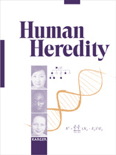
HUMAN HEREDITY
Advancing Knowledge in Genetics and Inherited TraitsHUMAN HEREDITY is a peer-reviewed journal published by KARGER, dedicated to advancing the understanding of genetics and inherited traits in human populations. Established in 1950, this journal has become a vital resource for researchers, professionals, and students in the fields of genetics and clinical genetics, currently categorized in the third quartile (Q3) for both general and clinical genetics as of 2023. With an ISSN of 0001-5652, HUMAN HEREDITY provides rigorous academic content that analyzes heredity patterns and genetic variations, aiming to illuminate the complexities of human genetic inheritance. Although it does not operate on an open access model, the journal offers a comprehensive collection of studies and insights that are crucial for genetic research and clinical applications. Situated in Basel, Switzerland, HUMAN HEREDITY contributes to the global dialogue in genetics, making it an essential platform for those seeking to enrich their understanding of human heredity in a rapidly evolving scientific landscape.

HUMAN GENETICS
Exploring the genetic blueprint of humanity.HUMAN GENETICS, published by SPRINGER, stands as a cornerstone journal in the field of genetics, offering a wealth of research insights since its inception in 1964. Hailing from Germany, this esteemed journal boasts an impressive Q1 ranking in both Genetics and Clinical Genetics, marking it among the top quartile of journals in these categories for 2023. With a notable Scopus rank of #7 in Clinical Genetics and a percentile ranking of 93, HUMAN GENETICS attracts significant attention from researchers and professionals dedicated to advancing our understanding of genetic influences on human health and disease. Although it does not currently offer Open Access options, the journal provides a critical platform for scholarly communication, aimed at disseminating groundbreaking findings in genetics and biotechnology. As the field evolves, HUMAN GENETICS continues to play an instrumental role in bridging the gap between laboratory research and clinical application, making it an essential resource for students and seasoned researchers alike.

Medizinische Genetik
Illuminating the Path of Clinical Genetics.Medizinische Genetik is a distinguished academic journal, published by Walter de Gruyter GmbH, that serves the field of medical genetics, offering insights and developments in both clinical and laboratory settings. Since its inception in 1994, the journal has provided a platform for researchers and professionals to disseminate their findings, contributing significantly to scientific discourse in genetics. Although currently listed in the Q4 category for both Genetics and Clinical Genetics according to the 2023 rankings, it remains a vital resource for those looking to understand the evolving landscape of medical genetics. This peer-reviewed journal is accessible through various academic platforms, fostering collaboration and knowledge sharing among academics, clinicians, and students alike. As the journal converges towards 2024, it continues to solidify its role in enhancing the understanding of genetic disorders and innovations in genetic research.
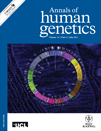
ANNALS OF HUMAN GENETICS
Fostering Collaboration for Genetic BreakthroughsANNALS OF HUMAN GENETICS is a distinguished peer-reviewed journal extensively covering the field of genetics, published by Wiley. Established in 1954 and extending its influence into 2024, this journal features comprehensive research articles, reviews, and case studies aimed at advancing our understanding of human genetic conditions and their implications on health. With its ISSN number 0003-4800 and E-ISSN 1469-1809, the journal has carved a prominent niche within the academic community, currently ranking in the third quartile in both genetic and clinical genetics categories (Q3, 2023). Its Scopus rankings reflect its credibility, placing it #54 out of 99 in clinical genetics. Though it is not open access, it remains an essential resource for researchers and practitioners seeking to explore the latest findings and methodologies in genetics, serving as a critical platform for knowledge dissemination and dialogue within the scientific community. As we delve deeper into the complexities of our genetic makeup, the ANNALS OF HUMAN GENETICS continues to play a vital role in fostering innovation and collaboration in this ever-evolving field.

EUROPEAN JOURNAL OF HUMAN GENETICS
Exploring the Complexities of HeredityThe EUROPEAN JOURNAL OF HUMAN GENETICS, published by SpringerNature, stands as a preeminent platform in the field of genetics and clinical genetics. Established in 1993, this prestigious journal, with an ISSN of 1018-4813 and an E-ISSN of 1476-5438, has consistently maintained its position in the Q1 quartile for both Genetics and Clinical Genetics categories as of 2023, reflecting its significant contributions to the field. Its impact is further underscored by its impressive Scopus rankings, placing it in the 92nd percentile among clinical genetics journals. The journal aims to disseminate cutting-edge research, case studies, and reviews that advance our understanding of human genetics, promoting collaboration and innovation among researchers, professionals, and students alike. While it does not currently offer open access, the journal provides substantial value through its rigorous peer review process and commitment to quality. As it continues to shape the future of genetic research through 2024 and beyond, the EUROPEAN JOURNAL OF HUMAN GENETICS remains an essential resource for those dedicated to exploring the complexities of human heredity.
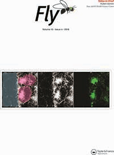
FLY
Fostering Collaboration in Insect ResearchFLY, an esteemed journal published by Taylor & Francis Inc, is a leading resource in the field of Insect Science, offering cutting-edge research and insights into the biology, ecology, and management of flies and related insect species. With an impressive Impact Factor reflecting its high citation and publication standards, FLY serves as a vital platform for researchers and practitioners aiming to advance their understanding of this diverse and crucial group of organisms. The journal, which has been publishing since 2007 and is set to continue until 2024, is recognized as a Q1 category journal in its discipline, ranked 58 out of 181 in Agricultural and Biological Sciences, placing it in the 68th percentile of the field. Although currently non-open access, the journal is committed to disseminating valuable knowledge and fostering collaboration among scientists, offering unparalleled opportunities for professionals, researchers, and students to engage with transformative science in the insect realm.

JOURNAL OF GENETIC PSYCHOLOGY
Transforming Knowledge on Genetics in Psychological ScienceJOURNAL OF GENETIC PSYCHOLOGY, published by Routledge Journals, Taylor & Francis Ltd, stands as a prominent outlet within the fields of Clinical Psychology, Developmental Psychology, and Life-span Studies. Since its inception in 1946, this journal has played a pivotal role in disseminating transformative research that explores the intricate links between genetics and psychological phenomena. With an impact factor that reflects its scholarly rigor and recognition, the journal is categorized in the Q2 quartile across multiple psychology domains, underscoring its significance in advancing knowledge and practical applications in psychological sciences. The journal features a broad range of articles—from empirical studies to theoretical reviews—fostering a vibrant academic dialogue among researchers, professionals, and students alike. Although currently not an open-access journal, it provides robust subscription options for institutions and individuals seeking to engage with cutting-edge research. Whether you are looking to enrich your academic portfolio or stay at the forefront of psychological science, JOURNAL OF GENETIC PSYCHOLOGY remains an essential resource. For more information or to explore our latest issues, please visit our site.
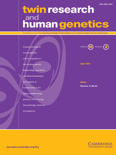
Twin Research and Human Genetics
Bridging Twin Studies and Genetics for a Healthier TomorrowTwin Research and Human Genetics, published by Cambridge University Press, is a leading academic journal that focuses on the vital intersections of genetics, human development, and twin studies. With an ISSN of 1832-4274 and E-ISSN 1839-2628, this journal serves as a critical resource for researchers, healthcare professionals, and students interested in advancing their understanding of genetic influences on human health and behavior. In its dedication to disseminating high-quality research, Twin Research and Human Genetics holds impressive category quartile rankings, including Q2 in Pediatrics, Perinatology, and Child Health, and Q3 in both Genetics (Clinical) and Obstetrics and Gynecology as of 2023. The journal has a converged publication timeline from 2005 to 2024, providing a longstanding platform for rigorous scientific inquiry and discussion in its specialized fields. As an open-access title, it fosters accessibility to vital findings and promotes collaboration among scholars worldwide, ensuring that groundbreaking research reaches a broader audience. Positioned within a challenging and competitive landscape, this journal stands out for its commitment to excellence and its pivotal role in shaping the future of genetic research and its implications for health across the lifespan.
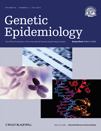
GENETIC EPIDEMIOLOGY
Bridging Genetics and Epidemiology for Better HealthGENETIC EPIDEMIOLOGY is a pioneering journal published by Wiley that bridges the fields of genetics and epidemiology to advance our understanding of the genetic underpinnings of health and disease. Established in 1984 and converging into its 40th year of impactful research in 2024, this journal offers a key platform for the dissemination of innovative research findings, statistical methods, and applications in both clinical genetics and epidemiological practices. With a robust presence in Scopus, ranking in the second quartile (Q2) for both epidemiology and clinical genetics, it enjoys a significant reputation among its peers. The journal does not currently offer open access, but it is vital for researchers, professionals, and students committed to exploring the evolving landscape of genetic influences on population health. Its rich repository of studies not only enhances knowledge but also informs public health policies and clinical practices worldwide, making it an indispensable resource for those seeking to innovate and apply genetic research in the quest for better health outcomes.